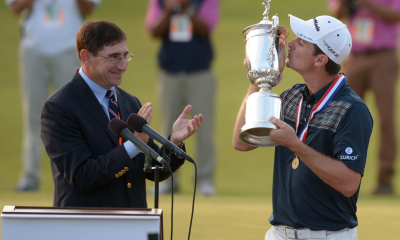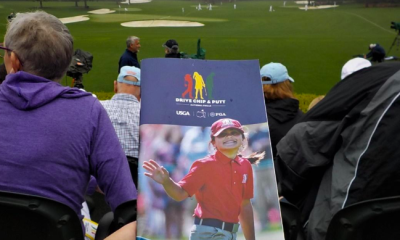Opinion & Analysis
Why do golf’s ruling bodies keep making the game more difficult?

Golf is one of the most difficult games on the planet. So why is it that golf’s ruling bodies, the USGA and R&A, continue to establish new rules that make the game more difficult?
The argument is often made that we need to protect the integrity of the game. If that is the case, we need to all immediately go back to using all wooden clubs and feathery golf balls. And let’s go back to letting sheep maintain our golf courses, too.
Innovation is good for the game. Lower scores are more entertaining at the professional level, and much more fun for the amateur golfer. They bring more fans, more revenue, more players and a generally healthier industry.
Let’s look at the last three major decisions with respect to the rules of golf:
- Limiting the spring-like effect (COR) of drivers
Limiting the coefficient of restitution (COR) in a driver limits the distance that golfers will hit a golf ball. Longer drives bring crowds to PGA Tour events. Bubba Watson is one of the hottest players on the PGA Tour and John Daly is still popular for this very reason. Amateur players benefit from hitting shorter clubs into every hole with a hotter driver.
- Dulling grooves in wedges and irons
Controlling a groove’s volume and sharpness limits the amount of backspin that can be generated, particularly out of lies in the rough. This will lessen the ability of golfers to hold greens, and depending on conditions it can lead to higher scores — players will have to either pitch or chip instead of putt.
Again, lower scores lead to a more entertaining product and less enjoyment at the amateur level. If you look at scoring at the highest level, one could argue that this ruling really hasn’t affected touring pros – if it has, the changes are minimal. Amateur golfers were the one who lost in this scenario, especially the ones who like to play by the same rules as the pros and were forced to buy new wedges.
- Anchoring of the putter
Anchoring the putter will allow some players to get more enjoyment out of the game, and for some it will allow them to play at a higher level. Some use the technique to escape the yips, while others use anchoring for health reasons. Regardless of why a player decides to use an anchoring technique, it will immediately make the game more difficult for some by not allowing all to give the technique a try.
The bottom line is that the governing bodies should not be focusing on making the game more difficult for the less than 1 percent of the golfing population that make a living playing the game. They should allow innovation to make the game more fun for us all. Making the game more fun for most of us will also allow for a more entertaining product with lower scores. If you want to protect par in your championships, don’t make the game more difficult by changing the rules and stifling innovation. Make the rough higher, the fairways narrower and greens smaller in your course setups. Yes, I’m talking to you Mike Davis.
Opinion & Analysis
The 2 primary challenges golf equipment companies face

As the editor-in-chief of this website and an observer of the GolfWRX forums and other online golf equipment discourse for over a decade, I’m pretty well attuned to the grunts and grumbles of a significant portion of the golf equipment purchasing spectrum. And before you accuse me of lording above all in some digital ivory tower, I’d like to offer that I worked at golf courses (public and private) for years prior to picking up my pen, so I’m well-versed in the non-degenerate golf equipment consumers out there. I touched (green)grass (retail)!
Complaints about the ills of and related to the OEMs usually follow some version of: Product cycles are too short for real innovation, tour equipment isn’t the same as retail (which is largely not true, by the way), too much is invested in marketing and not enough in R&D, top staffer X hasn’t even put the new driver in play, so it’s obviously not superior to the previous generation, prices are too high, and on and on.
Without digging into the merits of any of these claims, which I believe are mostly red herrings, I’d like to bring into view of our rangefinder what I believe to be the two primary difficulties golf equipment companies face.
One: As Terry Koehler, back when he was the CEO of Ben Hogan, told me at the time of the Ft Worth irons launch, if you can’t regularly hit the golf ball in a coin-sized area in the middle of the face, there’s not a ton that iron technology can do for you. Now, this is less true now with respect to irons than when he said it, and is less and less true by degrees as the clubs get larger (utilities, fairways, hybrids, drivers), but there remains a great deal of golf equipment truth in that statement. Think about it — which is to say, in TL;DR fashion, get lessons from a qualified instructor who will teach you about the fundamentals of repeatable impact and how the golf swing works, not just offer band-aid fixes. If you can’t repeatably deliver the golf club to the golf ball in something resembling the manner it was designed for, how can you expect to be getting the most out of the club — put another way, the maximum value from your investment?
Similarly, game improvement equipment can only improve your game if you game it. In other words, get fit for the clubs you ought to be playing rather than filling the bag with the ones you wish you could hit or used to be able to hit. Of course, don’t do this if you don’t care about performance and just want to hit a forged blade while playing off an 18 handicap. That’s absolutely fine. There were plenty of members in clubs back in the day playing Hogan Apex or Mizuno MP-32 irons who had no business doing so from a ballstriking standpoint, but they enjoyed their look, feel, and complementary qualities to their Gatsby hats and cashmere sweaters. Do what brings you a measure of joy in this maddening game.
Now, the second issue. This is not a plea for non-conforming equipment; rather, it is a statement of fact. USGA/R&A limits on every facet of golf equipment are detrimental to golf equipment manufacturers. Sure, you know this, but do you think about it as it applies to almost every element of equipment? A 500cc driver would be inherently more forgiving than a 460cc, as one with a COR measurement in excess of 0.83. 50-inch shafts. Box grooves. And on and on.
Would fewer regulations be objectively bad for the game? Would this erode its soul? Fortunately, that’s beside the point of this exercise, which is merely to point out the facts. The fact, in this case, is that equipment restrictions and regulations are the slaughterbench of an abundance of innovation in the golf equipment space. Is this for the best? Well, now I’ve asked the question twice and might as well give a partial response, I guess my answer to that would be, “It depends on what type of golf you’re playing and who you’re playing it with.”
For my part, I don’t mind embarrassing myself with vintage blades and persimmons chasing after the quasi-spiritual elevation of a well-struck shot, but that’s just me. Plenty of folks don’t give a damn if their grooves are conforming. Plenty of folks think the folks in Liberty Corner ought to add a prison to the museum for such offences. And those are just a few of the considerations for the amateur game — which doesn’t get inside the gallery ropes of the pro game…
Different strokes in the game of golf, in my humble opinion.
Anyway, I believe equipment company engineers are genuinely trying to build better equipment year over year. The marketing departments are trying to find ways to make this equipment appeal to the broadest segment of the golf market possible. All of this against (1) the backdrop of — at least for now — firm product cycles. And golfers who, with their ~15 average handicap (men), for the most part, are not striping the golf ball like Tiger in his prime and seem to have less and less time year over year to practice and improve. (2) Regulations that massively restrict what they’re able to do…
That’s the landscape as I see it and the real headwinds for golf equipment companies. No doubt, there’s more I haven’t considered, but I think the previous is a better — and better faith — point of departure when formulating any serious commentary on the golf equipment world than some of the more cynical and conspiratorial takes I hear.
Agree? Disagree? Think I’m worthy of an Adam Hadwin-esque security guard tackle? Let me know in the comments.
@golfoncbs The infamous Adam Hadwin tackle ? #golf #fyp #canada #pgatour #adamhadwin ? Ghibli-style nostalgic waltz – MaSssuguMusic
Podcasts
Fore Love of Golf: Introducing a new club concept

Episode #16 brings us Cliff McKinney. Cliff is the founder of Old Charlie Golf Club, a new club, and concept, to be built in the Florida panhandle. The model is quite interesting and aims to make great, private golf more affordable. We hope you enjoy the show!
Opinion & Analysis
On Scottie Scheffler wondering ‘What’s the point of winning?’

Last week, I came across a reel from BBC Sport on Instagram featuring Scottie Scheffler speaking to the media ahead of The Open at Royal Portrush. In it, he shared that he often wonders what the point is of wanting to win tournaments so badly — especially when he knows, deep down, that it doesn’t lead to a truly fulfilling life.
View this post on Instagram
“Is it great to be able to win tournaments and to accomplish the things I have in the game of golf? Yeah, it brings tears to my eyes just to think about it because I’ve literally worked my entire life to be good at this sport,” Scheffler said. “To have that kind of sense of accomplishment, I think, is a pretty cool feeling. To get to live out your dreams is very special, but at the end of the day, I’m not out here to inspire the next generation of golfers. I’m not out here to inspire someone to be the best player in the world, because what’s the point?”
Ironically — or perhaps perfectly — he went on to win the claret jug.
That question — what’s the point of winning? — cuts straight to the heart of the human journey.
As someone who’s spent over two decades in the trenches of professional golf, and in deep study of the mental, emotional, and spiritual dimensions of the game, I see Scottie’s inner conflict as a sign of soul evolution in motion.
I came to golf late. I wasn’t a junior standout or college All-American. At 27, I left a steady corporate job to see if I could be on the PGA Tour starting as a 14-handicap, average-length hitter. Over the years, my journey has been defined less by trophies and more by the relentless effort to navigate the deeply inequitable and gated system of professional golf — an effort that ultimately turned inward and helped me evolve as both a golfer and a person.
One perspective that helped me make sense of this inner dissonance around competition and our culture’s tendency to overvalue winning is the idea of soul evolution.
The University of Virginia’s Division of Perceptual Studies has done extensive research on reincarnation, and Netflix’s Surviving Death (Episode 6) explores the topic, too. Whether you take it literally or metaphorically, the idea that we’re on a long arc of growth — from beginner to sage elder — offers a profound perspective.
If you accept the premise literally, then terms like “young soul” and “old soul” start to hold meaning. However, even if we set the word “soul” aside, it’s easy to see that different levels of life experience produce different worldviews.
Newer souls — or people in earlier stages of their development — may be curious and kind but still lack discernment or depth. There is a naivety, and they don’t yet question as deeply, tending to see things in black and white, partly because certainty feels safer than confronting the unknown.
As we gain more experience, we begin to experiment. We test limits. We chase extreme external goals — sometimes at the expense of health, relationships, or inner peace — still operating from hunger, ambition, and the fragility of the ego.
It’s a necessary stage, but often a turbulent and unfulfilling one.
David Duval fell off the map after reaching World No. 1. Bubba Watson had his own “Is this it?” moment with his caddie, Ted Scott, after winning the Masters.
In Aaron Rodgers: Enigma, reflecting on his 2011 Super Bowl win, Rodgers said:
“Now I’ve accomplished the only thing that I really, really wanted to do in my life. Now what? I was like, ‘Did I aim at the wrong thing? Did I spend too much time thinking about stuff that ultimately doesn’t give you true happiness?’”
Jim Carrey once said, “I think everybody should get rich and famous and do everything they ever dreamed of so they can see that it’s not the answer.”
Eventually, though, something shifts.
We begin to see in shades of gray. Winning, dominating, accumulating—these pursuits lose their shine. The rewards feel more fleeting. Living in a constant state of fight-or-flight makes us feel alive, yes, but not happy and joyful.
Compassion begins to replace ambition. Love, presence, and gratitude become more fulfilling than status, profits, or trophies. We crave balance over burnout. Collaboration over competition. Meaning over metrics.
Interestingly, if we zoom out, we can apply this same model to nations and cultures. Countries, like people, have a collective “soul stage” made up of the individuals within them.
Take the United States, for example. I’d place it as a mid-level soul: highly competitive and deeply driven, but still learning emotional maturity. Still uncomfortable with nuance. Still believing that more is always better. Despite its global wins, the U.S. currently ranks just 23rd in happiness (as of 2025). You might liken it to a gifted teenager—bold, eager, and ambitious, but angsty and still figuring out how to live well and in balance. As much as a parent wants to protect their child, sometimes the child has to make their own mistakes to truly grow.
So when Scottie Scheffler wonders what the point of winning is, I don’t see someone losing strength.
I see someone evolving.
He’s beginning to look beyond the leaderboard. Beyond metrics of success that carry a lower vibration. And yet, in a poetic twist, Scheffler did go on to win The Open. But that only reinforces the point: even at the pinnacle, the question remains. And if more of us in the golf and sports world — and in U.S. culture at large — started asking similar questions, we might discover that the more meaningful trophy isn’t about accumulating or beating others at all costs.
It’s about awakening and evolving to something more than winning could ever promise.





















butch
Dec 1, 2012 at 8:41 am
For whatever it is worth I don’t think any of these “improvements” made the game any easier for the average golfer. The average golfer can’t compress the spring on a high COR driver, doesn’t hit the ball cleanly enough in the rough to benefit from square grooves and in my group of golfers I have not seen anyone improve their putting stats from using a long putter. So the real game that is being “protected” is the professional game and very high level (future pros) amateur golf game.
But having said that the point is well taken that we don’t want to go back to wooden clubs and feather balls. I don’t even want to go back to wooden headed, steel shafted driver. So advancing technology has kept some of us in the game by giving us a chance to play well.
mpierce
Nov 30, 2012 at 6:13 pm
Poorly thought out article…written to stir the kettle. Why not just keeping letting manufacturers make the equipment hit it farther, make the ball go longer and keep obsoleting more and more great courses? The game can always benefit from developers building more courses on bigger parcels of land that go bankrupt or existing courses can always find more land. Oversized drivers, long distance balls and anchoring the putter should have been banned on day one. They stopped Sam Snead from putting side saddle and deemed the stroke illegal. 13 clubs you swing and one you don’t. I think it is time for the governing bodies to govern by simplifying and purifying the rules. The threat of litigation from manufacturers and players has reduced ability to act decisively for the good of the game!
stu
Nov 30, 2012 at 5:17 pm
Its a game of skill, talent, control of spin, flight, distance…………..get a grip.
Anchoring is not part of the game, its not a swing, not like the game was intended to be played.
The only part of your body to touch the club should be your hands, two points. Not your chin and two hands, not your belly and two hands which are three points. The r and a and the pgatour should have also banned Kuchars grip also.
Play a different sport if you cant stick to the rules
Scott
Nov 30, 2012 at 11:35 pm
Putters have been anchored for over 100 years. Stu, you have some anger issues you need worked out.
stu
Dec 1, 2012 at 12:20 pm
you are right Scott, I do have anger issues, only with those who dont care about the values of the game. Think about the title “why do they keep making the game harder”…going by the way that idiot thinks we should play every hole with driver then lob wedge. Technology has made golf as easy as its ever been, but rather than work on their game or get some lessons, these bozos think they can just buy the latest driver and it will solve everything.
We have a generation that have not hit and cannot hit 2,3, 4 or 5 irons because they would rather hit a hybrid!!!
same with the long putters!!
Those Bodies are just preserving the game.
Scott
Dec 3, 2012 at 1:33 am
I look forward to seeing you play some day with your hickory shafts and gutta-percha balls. Oh, and shoot your 130 score. However, I agree that people need to spend more money on lessons than equipment and they should focus on a quicker pace of play, while they are at it. See, these are two issues that should be addressed before worrying about long putters (or hybrids). Almost every sport has specialized equipment for different situations e.g. catcher’s mitt in baseball, or a kicker in football, goalie equipment in hockey, (not really a sport but NASCAR tunes each car differently for each track – and the cars are hardly “stock”). If they allow “claw” grips why not anchoring? As soon as I see players clear their hips and have a full shoulder turn on the putting green, I will agree with those who like the ban of the long putter. The proposed ban is very inconsistent and a horrible ruling. Look for the USGA and R&A to see the error of their ways and overturn the ruling during the 90 day review period.
stu
Dec 5, 2012 at 5:39 pm
Scott , the only reason I may shoot 130, is because the length of courses we have today as a direct result of the technology. I’ll play the old gear , on an old course length , no probs. There will be no 130.!
I play a European handicap system, single figure golfer, and all through practice and effort.
Same mizuno mp-33 irons for the last 8/9 years.
2 iron and all, no hybrids.
My rant was not for the sake of nothing. The article is poorly thought out. I stand by my point that it has never been easier to play the game because of the equipment.
As for the specialized equipment, I have no probs with any of them, as long as its with a swing and in keeping with the game. Two hands only on the club no matter what the length and as long as the stance and stroke are within the rules. And you are right the rule is a little vague, (I would rather they banned Kuchars stroke too), but it is a step in the right direction, for the good of the sport. The main bone of contention for me is that they were irresponsible to have left it this long. I feel for the likes of Tom Kite and Bernhard Langer who have been using it for prob 20 yrs.
Next step is the ball, change how far the ball travels and watch the shot makers rise to the top. Its been fun and thanks for taking the time to comment. If you ever come to Ireland, bring the hickory and persimmon and we’ll play a few……
stu
Nov 30, 2012 at 5:10 pm
Stop whining,
Why cant we change balls from distance balls for your drive and to a soft ball for wedges and putts.
Why cant we have 20+ clubs in the bag.
Why cant we tee it up in the fairway too or have placing all year round.
Why cant we have mulligans and gimmies in a comp.
Stop whining, we have titanium drivers, balls that dont spin off the driver but dont roll away on approach shots, hybrids, lighter shafts, adjustable clubs, basically every imaginable technology to make the game easy and you complain about making the game hard?
Eric
Nov 30, 2012 at 12:18 pm
Forget integrity of the game.
Let’s focus on what makes this game fun- it’s the challenge.
If you want easy, go tee off the ladies tee.
If you want a rewarding round of golf, find the appropriate tee for your driving distance, and then play.
Do the best you can with the equipment you have. If you want to shoot lower, find someone better than you, and let him hit the shot for you. It’s called a scramble – then you can have “fun”. If you want true enjoyment, then simply play well.
alexander park
Nov 29, 2012 at 6:26 pm
amen